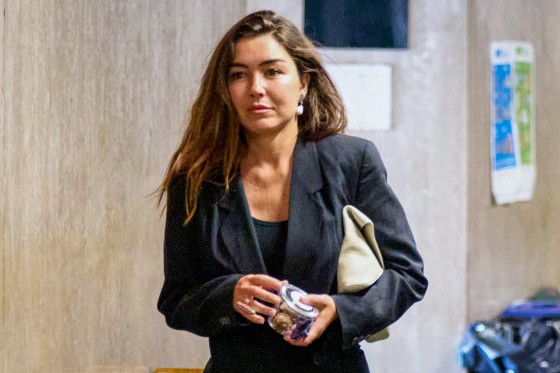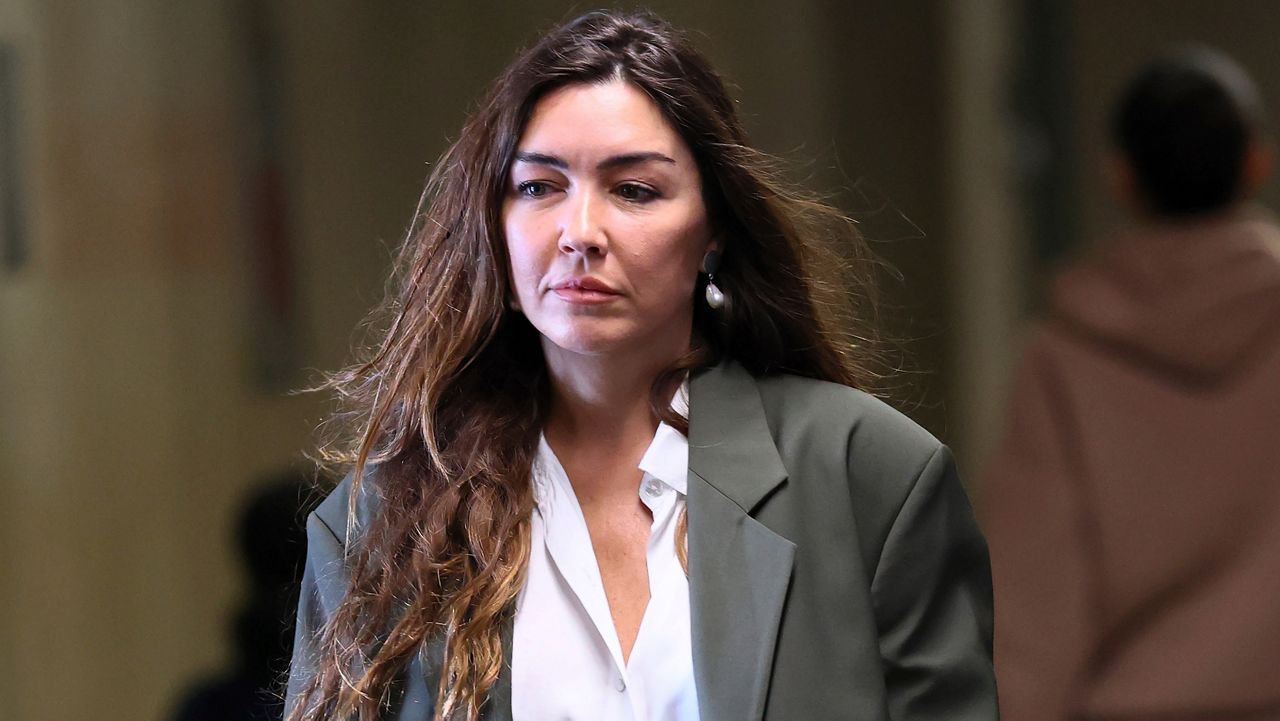Can one moment define a lifetime? For Miriam "Mimi" Haley, the answer is a resounding and painful yes, as her experiences with Harvey Weinstein have indelibly marked her journey. The retrial of Harvey Weinstein has once again thrust Haley into the spotlight, a place she never sought, yet one where her voice carries immense weight.
The courtroom on a Monday became a crucible of raw emotion as Mimi Haley, a former production assistant on "Project Runway," recounted the harrowing details of her alleged assault by Harvey Weinstein. Her voice, thick with emotion, filled the room as she described to the jurors how the former film mogul allegedly pinned her down in his Manhattan apartment in 2006 and forced her into a sex act. The scene painted was vivid and disturbing, a stark reminder of the power dynamics at play and the lasting impact of such experiences. This testimony arrives amidst a backdrop of legal complexities, as Weinstein's initial conviction was overturned, leading to this crucial retrial. Haley, also known as Mimi Haleyi, stands as one of the key accusers, her willingness to face her alleged abuser again a testament to her courage and determination to seek justice. Her testimony on that Wednesday, brought back to the forefront the graphic details of the alleged sexual assault, forcing everyone to confront the brutal realities of her experience.
| Category | Information |
|---|---|
| Full Name | Miriam "Mimi" Haley (formerly known as Mimi Haleyi) |
| Occupation | Former Production Assistant |
| Known For | Accuser in the Harvey Weinstein sexual assault case |
| Date of Alleged Assault | 2006 |
| Legal Action | Testified in Harvey Weinstein's trial and retrial |
| Key Testimony Detail | Alleged forced sex act in Weinstein's Manhattan apartment |
| Emotional Impact | Broke down sobbing during testimony |
| Name Change | Legally changed name to Mimi Haley after publicly sharing her story in 2017 |
| Films/TV (Mentioned) | Project Runway (as Production Assistant) |
| Additional Notes | Considering future legal steps after the overturning of Weinstein's conviction |
| External Links | New York Times Article on Mimi Haley's Testimony |
The weight of the past hung heavy in the air as Haley recounted the events. Through tears, she described how, each time she attempted to escape, Weinstein allegedly pushed her back down onto the bed, holding her against her will. Her emotional recounting laid bare the powerlessness she felt in that moment, a feeling that has lingered for years. The echoes of her testimony resonated far beyond the courtroom. Her words painted a picture of alleged coercion and control, highlighting the imbalance of power that Weinstein allegedly exploited. The use of force, as she described it, left a lasting scar, both physically and emotionally. The act of testifying, of reliving the trauma, was undoubtedly a difficult one for Haley. Each question from Assistant District Attorney Meghan Hast must have felt like a reopening of old wounds. However, her willingness to persevere, to face her alleged abuser in court, speaks volumes about her resilience and her commitment to seeking justice.
- Inside Amal Clooneys Dream Wedding Dress Details More
- Rock News Jim Peterik World Stage Feat Joel Hoekstra More
The defense, of course, presented a different narrative. Weinstein has consistently denied any wrongdoing, claiming that any encounters were consensual. This clash of narratives is at the heart of the trial, forcing the jury to weigh the evidence and determine the truth. The defense strategy often involved questioning the accusers' motives and highlighting any inconsistencies in their stories. This is a common tactic in sexual assault cases, aiming to cast doubt on the accusers' credibility and create reasonable doubt in the minds of the jurors. However, Haley's emotional testimony and detailed account of the alleged assault made her a compelling witness. Her story, while painful to hear, carried a weight of authenticity that resonated with many.
Adding another layer of complexity to the case is the overturning of Weinstein's previous conviction. This decision by the appeals court threw the entire legal process into disarray, forcing Haley and the other accusers to relive their experiences once again. The prospect of another trial, of having to prepare and testify again, was undoubtedly daunting. Haley expressed her uncertainty about whether she wanted to endure such an ordeal, acknowledging the trauma that it would inevitably bring. The legal system, while designed to ensure justice, can often be a long and arduous process, particularly in cases involving sexual assault. The emotional toll on the victims is often immense, requiring them to repeatedly confront their trauma in a public and adversarial setting.
Despite the challenges, Haley chose to move forward, to once again stand up and tell her story. Her decision reflects a deep-seated desire for accountability, a hope that Weinstein will finally be held responsible for his alleged actions. Her courage in the face of adversity has inspired many, not only those who have experienced similar trauma but also those who believe in the importance of justice. Haley's willingness to speak out, to publicly confront her alleged abuser, has contributed to a broader conversation about sexual harassment and assault in the workplace and beyond.
- Friends The One With The Stoned Guy Episode Amp More
- Jeri Ryan From Seven Of Nine To Beach Babe Photos
The case has also highlighted the role of Non-Disclosure Agreements (NDAs) in silencing victims of sexual misconduct. Weinstein, it was revealed, had numerous NDAs in place, agreements that prevented his accusers from speaking out about their experiences. These agreements, while legal, have been criticized for enabling perpetrators to continue their abuse without facing consequences. The prevalence of NDAs in such cases underscores the need for greater transparency and accountability, ensuring that victims are not silenced and that perpetrators are held responsible for their actions.
The impact of the #MeToo movement cannot be overstated in this context. The movement provided a platform for survivors of sexual harassment and assault to share their stories, creating a climate of greater awareness and support. #MeToo empowered many women, including Mimi Haley, to come forward and speak out against their abusers. The movement challenged the culture of silence and impunity that had long protected perpetrators, creating a space for victims to be heard and believed. The movement also brought about significant changes in workplace policies and practices, with many companies implementing stricter measures to prevent and address sexual harassment.
While the legal proceedings continue, Mimi Haley's impact is undeniable. She has become a symbol of courage and resilience, a voice for those who have been silenced. Her willingness to speak out, to confront her alleged abuser, has made a difference in the lives of many. Her story serves as a reminder that justice is not always easy to achieve, but that it is always worth fighting for. Whether or not Weinstein is ultimately convicted, Haley's legacy as a survivor and an advocate will endure.
The photograph of Harvey Weinstein appearing in court in New York on that Wednesday, a stark visual reminder of the legal battle unfolding, serves as a powerful backdrop to Haley's testimony. (Spencer Platt/Pool Photo via AP). The image captures the gravity of the situation, the weight of the accusations, and the intense scrutiny that both Weinstein and his accusers face. The courtroom setting, with its formal procedures and legal jargon, can often feel impersonal and detached. However, Haley's emotional testimony brought a human element to the proceedings, reminding everyone that these are not just legal abstractions but real people with real experiences.
Miriam "Mimi" Haley's consideration of screaming "rape" when Harvey Weinstein allegedly began forcibly performing oral sex on her in his apartment in 2006 highlights the agonizing decisions victims often face in the midst of an assault. Her statement, "My brain was calculating what was the best course of action at that moment," underscores the fear and uncertainty that can paralyze individuals during such traumatic events. The decision to fight back, to scream for help, or to remain silent is often a complex calculation, influenced by fear, self-preservation, and the perceived likelihood of rescue. Haley's internal struggle reflects the psychological toll of sexual assault, the lasting impact on victims' sense of safety and control.
Haley's testimony is not merely a recounting of past events; it is a powerful statement about the ongoing impact of sexual assault on survivors. Her willingness to relive the trauma, to face her alleged abuser in court, demonstrates her unwavering commitment to seeking justice and preventing future harm. Her story serves as a reminder that the fight against sexual harassment and assault is far from over and that continued vigilance and advocacy are essential to creating a safer and more just world.
Weinstein's denial of wrongdoing towards Haley, Annabella Sciorra, and the other women who testified, as well as the "plethora of other voices unable to be heard in the court of law," underscores the systemic challenges in holding powerful individuals accountable for their actions. The fact that so many women have come forward with similar allegations suggests a pattern of behavior, a culture of abuse that Weinstein allegedly perpetuated for years. The voices of those who remain unheard, silenced by fear or legal agreements, represent a significant loss to the pursuit of justice. Their stories, while not formally presented in court, contribute to a broader understanding of the extent of Weinstein's alleged misconduct.
The revelation that Weinstein had "so many previous NDAs hiding his past sexual assaults" highlights the role of secrecy and cover-ups in enabling abuse. These agreements, while legally binding, often serve to protect perpetrators at the expense of their victims. The fact that Weinstein was allegedly "baffled at finally being held accountable" suggests a sense of entitlement, a belief that his power and wealth would shield him from the consequences of his actions. This sense of impunity is a common characteristic of abusers, who often operate under the assumption that they are above the law.
Haley's initial uncertainty about whether she wanted to participate in the retrial after Weinstein's conviction was overturned earlier this year reflects the immense emotional toll of the legal process. The prospect of having to relive the trauma, to face her alleged abuser again, was undoubtedly daunting. Her hesitation underscores the need for greater support and resources for survivors of sexual assault, ensuring that they have access to the counseling and legal assistance they need to navigate the complexities of the justice system. Despite her initial reservations, Haley ultimately chose to participate in the retrial, demonstrating her unwavering commitment to seeking justice and holding Weinstein accountable for his alleged actions.
Mimi Haley's experience is intertwined with films such as shoot me! 2 (2005), the last impresario (2013) and weinstein: these are the constant reminder of her experiences, that are connected to media.
Mimi Haley is an example for society and the world. The courage she showed by arriving at court for Weinsteins sentencing on March 11, 2020 is immense. And she will also be testifying in the retrial. Steven hirsch said that \u201cthere was #metoo, oprah winfrey, and then, you know, all\u201d.
- Nick Nikki Hexum From 311 To Hollywood Family Life
- Lori Greiner Photos Hot Looks Images More 2024 Update


